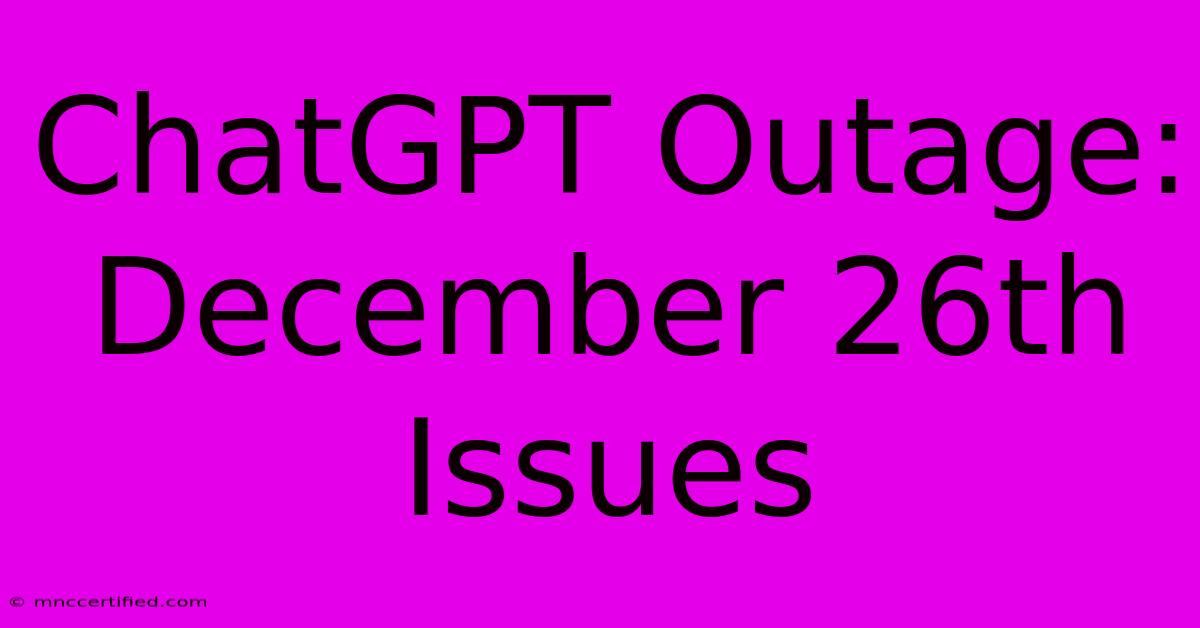ChatGPT Outage: December 26th Issues

Table of Contents
ChatGPT Outage: December 26th Issues – What Happened and What to Expect
On December 26th, 2023, many users experienced a significant ChatGPT outage. This widespread disruption sparked considerable frustration and raised questions about the reliability of the popular AI chatbot. This article delves into the details of the outage, explores potential causes, and offers insights into what users can expect in the future regarding service stability.
Understanding the December 26th ChatGPT Outage
Reports flooded social media platforms like Twitter and Reddit, with users expressing their inability to access ChatGPT. The outage wasn't limited to a specific region; reports poured in from across the globe, indicating a widespread service disruption. The exact duration of the outage varied depending on the user and their location, with some experiencing intermittent access while others faced complete unavailability for extended periods. The lack of official communication from OpenAI during the initial stages of the outage added to the confusion and frustration.
What Caused the Outage?
OpenAI, the company behind ChatGPT, has not yet released an official statement detailing the precise cause of the December 26th outage. However, several potential factors could be responsible:
- Increased Server Load: The holiday season often sees a surge in internet traffic and usage. It's possible that the unprecedented demand placed on OpenAI's servers overwhelmed their capacity, leading to the outage. This is a common cause of outages for popular online services.
- Software Glitch: A bug or software error within ChatGPT's infrastructure could have triggered the widespread disruption. Such glitches can be difficult to predict and often require immediate attention from engineers to resolve.
- Network Issues: Problems with OpenAI's network infrastructure, such as connectivity failures or routing problems, could also contribute to a widespread outage. This would impact the ability of users to connect to the ChatGPT servers.
- Third-Party Dependency Failures: ChatGPT might rely on third-party services for specific functionalities. If one of these services experiences an outage, it could cascade and impact ChatGPT's availability.
Learning from Past ChatGPT Outages
While the December 26th outage was significant, it's not the first time ChatGPT has experienced downtime. Analyzing past incidents can shed light on potential improvements and future expectations. Previous outages have highlighted the importance of:
- Improved Infrastructure: Investing in robust and scalable infrastructure is crucial for handling peak demand and minimizing the impact of potential outages.
- Proactive Monitoring: Real-time monitoring of server performance and network traffic can help identify potential issues before they escalate into full-blown outages.
- Transparent Communication: Open and timely communication with users during outages is essential for managing expectations and maintaining trust. OpenAI's lack of immediate communication during the December 26th incident was a notable shortcoming.
What to Expect in the Future
OpenAI is likely to implement improvements to prevent similar future outages. We can expect enhancements in:
- Redundancy and Failover Systems: Implementing redundant systems ensures that if one part of the infrastructure fails, another can take over seamlessly, minimizing downtime.
- Capacity Planning: Better forecasting of peak usage periods and scaling resources accordingly can prevent server overload.
- Improved Error Handling and Monitoring: Sophisticated monitoring tools and robust error handling mechanisms can proactively identify and resolve potential problems before they impact users.
The December 26th ChatGPT outage serves as a reminder that even the most popular online services are susceptible to downtime. While the precise cause of this particular outage remains unclear, it emphasizes the importance of robust infrastructure, proactive monitoring, and transparent communication in maintaining user trust and service reliability. The steps OpenAI is likely to take should lead to a more stable and reliable ChatGPT experience in the future.

Thank you for visiting our website wich cover about ChatGPT Outage: December 26th Issues. We hope the information provided has been useful to you. Feel free to contact us if you have any questions or need further assistance. See you next time and dont miss to bookmark.
Featured Posts
-
Outnumbered Returns Cast Update
Dec 27, 2024
-
Red Wings Hire Todd Mc Lellan
Dec 27, 2024
-
Premier League Chelsea 1 2 Fulham Review
Dec 27, 2024
-
Chat Gpt Service Interruption
Dec 27, 2024
-
After Christmas Sales What To Know
Dec 27, 2024